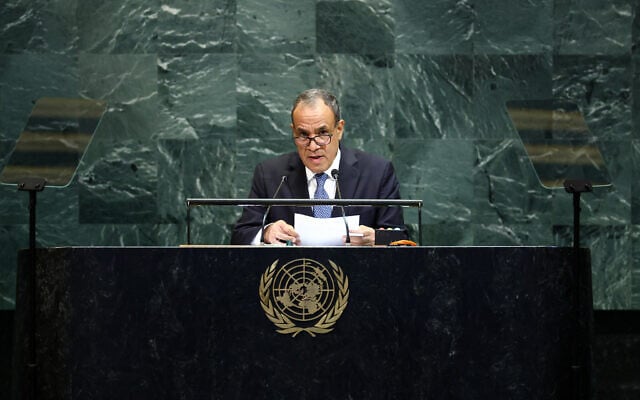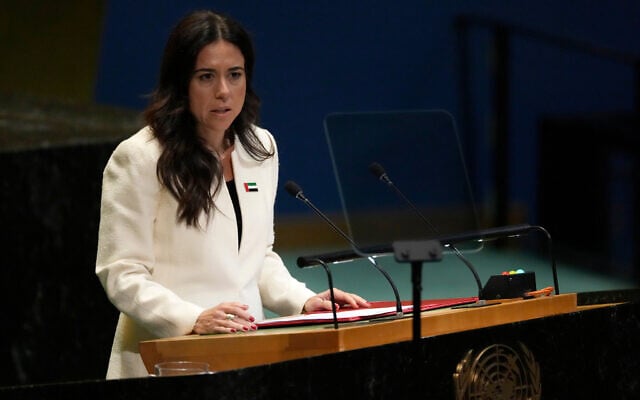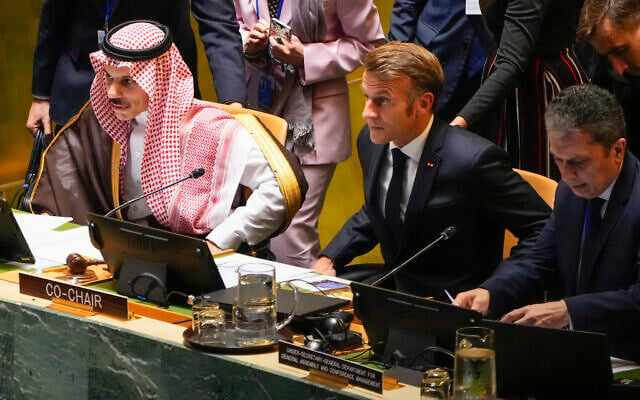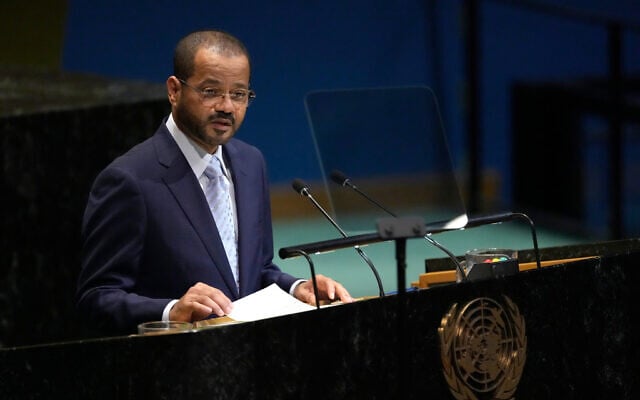

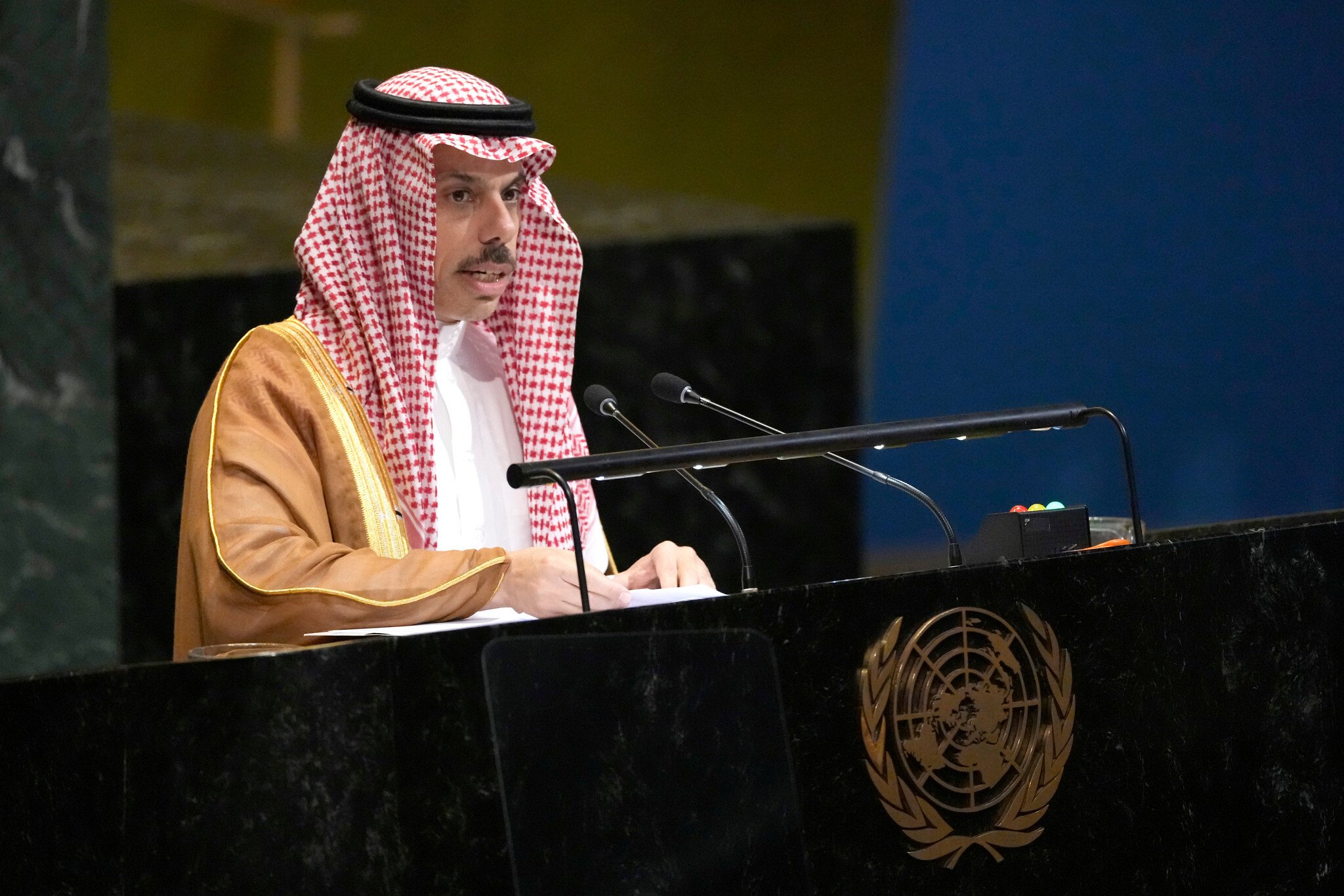
Representatives of Middle Eastern countries roundly condemned Israel as they took the floor at the General Debate of the United Nations General Assembly in New York on Saturday, accusing the Jewish state of committing acts of “genocide” in the Gaza Strip and calling for an independent Palestinian state.
Representing Cairo was Foreign Minister Badr Abdelatty, who focused the bulk of his speech on Egypt’s neighbor to the east, heavily criticizing it for the destruction in Gaza as well as for its military action further afield.
Jerusalem, he said, has an “extremist ideology” and is bent on destabilizing the region and contravening the purpose of the UN.
“The Middle East is at the point of implosion,” he warned, pointing to Israel’s “wanton aggression” as the cause of regional instability.
“Our Palestinian brothers and sisters and falling victim to the most heinous Israeli actions,” he bewailed. “It’s a war — a wanton, unjust war waged against defenseless civilians, for a sin they did not commit, driven by an extremist ideology.”
Israel’s war in Gaza, which is on the cusp of its third year, was sparked by the October 7, 2023, Hamas-led invasion of southern Israel, in which some 1,200 people were killed and 251 were seized as hostages.
In the 24 months since, the Hamas-run health ministry — whose figures cannot be verified and which does not differentiate between combatants and civilians — says that more than 65,000 Palestinians in Gaza have been killed.
Abdelatty declared that “the continued Israeli occupation, the genocide transpiring today in the Gaza Strip, depriving the Palestinian people of their legitimate rights, most notably the right to establish its independent state… hollows out any narrative of peace and security in the region.”
“Israel cannot be secure when others are not secure,” said the Egyptian foreign minister. “The region cannot see stability without an independent State of Palestine.”
Setting his sights on the wider region, Abdelatty condemned Israel’s recent strike targeting Hamas leaders in Qatar, and accused it of violating Lebanon’s and Syria’s sovereignty with repeated airstrikes within their borders.
“It is of utmost importance to respect the territorial integrity of Syria and Lebanon,” said the Egyptian foreign minister.
Reflecting briefly on Egypt’s momentous 1979 peace treaty with Israel, and Cairo’s status as the first country in the region to have signed such an agreement with Jerusalem, Abdelatty lamented that his country had “a vision for achieving peace in the region” but that this vision was “now at risk.”
The United Arab Emirates, one of the most recent countries to establish ties with Israel, having done so through the 2020 Abraham Accords agreement, also focused on Israel in a speech delivered by Foreign Minister Lana Nusseibeh.
Unlike Abdelatty, however, Nusseibeh stopped short of accusing Israel of genocide, and dedicated a portion of her speech to condemning the taking of hostages.
Still, she condemned Israel’s actions in the Gaza Strip, stressing that “nothing can justify targeting tens of thousands of civilians or besieging them or starving them and forcibly displacing them.”
“Nor,” she said, “can anything excuse the pursuit of unacceptable expansionist ambitions, including the threat of annexing the West Bank.”
“There is no justification for the taking of hostages or the targeting of civilians in conflict,” she said, appearing to refer indirectly to the abduction of 251 people at the hands of Hamas and other Gazan terror groups on October 7, 2023. Of that number, 47 are still held hostage, and Hamas is also holding the body of a soldier killed in Gaza in 2014.
“We emphasize the need to protect the hostages as per international humanitarian law,” said Nusseibeh.
She also fiercely condemned Israel’s attack in Doha, which she called “treacherous and reprehensible,” and said constituted a “flagrant violation of its territorial integrity and of the security of the Arabian Gulf region.”
“Aggression will not bring stability to the region,” she stressed.
Like her Egyptian counterpart, she called for the establishment of a Palestinian state “living side by side with Israel in security, peace and prosperity,” but said that the conditions for its establishment should include “restricting the use of weapons.”
A future two-state outcome should have “no place for terrorists and extremist groups,” she said.
Saudi Arabian Foreign Minister Prince Faisal bin Farhan — whose country does not have any relations with Israel and which has conditioned any normalization agreement on the implementation of the two-state solution — did not hold back in a speech that also focused heavily on Israel.
Near the start of his address, Prince Faisal lamented “the suffering of the Palestinian people and the unprecedented humanitarian crisis in Gaza,” before turning to condemn “the brutal and unchecked practices of the occupying forces, including starvation, forced displacement and systematic killing.”
All this, he said, was being done “in complete disregard of the historic and legal rights of the Palestinian people, with an aim to erase their legitimate rights.”
Calling for the establishment of a Palestinian state alongside Israel, he highlighted his country’s own efforts to that end. Saudi Arabia and France recently co-chaired a conference on the two-state solution, at which a string of Western nations announced they were recognizing a Palestinian state.
“It is time to find a just and lasting solution to the Palestinian issue,” the minister declared. “Military escalation will not achieve peace and security.”
In a somewhat less direct manner than Egypt’s Abdelatty, Faisal suggested that Israel’s actions in the Gaza Strip could amount to “genocide” — a charge which Israel has strongly rejected.
“The failure of the international community to take firm action to end the Israeli aggression and violations will only cause further instability and insecurity regionally and globally,” he said. “Such inaction will have great consequences and will escalate war crimes and acts of genocide.”
Like other speakers, he condemned Israel’s attack in Qatar, which appears to have failed to kill any of the senior Hamas leaders it had targeted, and instead killed five more junior members of the terror group, and a member of Qatar’s security forces.
Also speaking Saturday at the General Assembly, Oman’s Foreign Minister Badr al-Busaidi dedicated a portion of his speech to the war raging in Gaza, and called for the UN to place sanctions on Israel.
“For too long, this conflict has persisted, the suffering has grown unbearable, and the time has come to end the occupation, to undo the injustice, and to restore the legitimate rights of the Palestinian people through the implementation of the two-state solution,” he said.
Praising the string of Western countries that have recognized an independent Palestinian state in recent days, al-Busaidi urged them not to stop there.
Instead, he urged the international community “to adopt measures that limit the Israeli government’s ability to continue its policy of genocide, destruction, and illegal occupation of the Palestinian territories, and its ongoing policy of starvation and blockade against the Palestinian people and the obstruction of humanitarian assistance.”
“We call for imposing sanctions on Israel in response to its blatant violations of international law and its unlawful encroachments on the sovereignty of states,” he demanded.


